The BBC commissioned a report from Michael Blastland and Andrew Dilnot that was submitted to the BBC in November and has now been published. It had this title:

Although I am not a big fan of Andrew Dilnot's objectivity, Michael Blastland seems to have a good record on this issue, and the report is well worth reading. I think it is a genuine attempt to address the faults in the reporting of the issues noted in its title.
I will attach at the end of this post the summary pages from the report because they are worth looking at. What I wish to highlight instead are some of the issues raised in it which might get overlooked.
The overall finding was that there was weakness in reporting, but the resulting biases were to left and right, although I have to say that I do not think that the report supports that claim: most of the weaknesses noted appear to me to suggest under-reporting of the concerns of those who might be on the left.
The reasons for this, if the report is read carefully are:
- Economics reporters are not economically confident;
- Those reporters are too willing to have what they report dictated by political parties and, most especially, other media;
- Those biases are not questioned often enough, and nor are the assumptions that suggest that the issues reported are the real matters of concern;
- There are too few voices on the BBC, especially those inclined to offer alterative opinion, which by implication means that the neoliberal hegemony is reinforced;
- Inappropriate emphasis might be given to those numbers that appeal to those who seek to set the news agenda rather than those who are impacted by it.
I stress, these are my interpretation, but I think I too have tried to be fair. A couple of examples illustrate my points. This one is on household analogies:
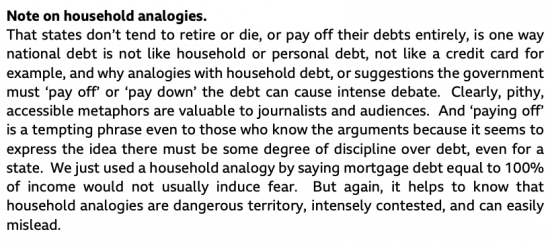
The points are well made, but how the alternative should be presented is not discussed.
Another example comes from the failure to report on bus travel

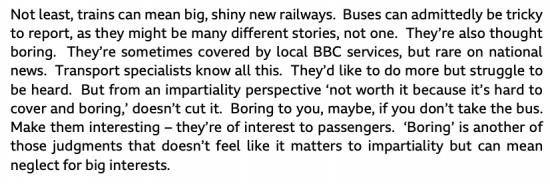
As a metaphor for the voices of many people not being heard because the journalists live in a different world, this was powerful.
So was this on the over-emphasis on income tax:
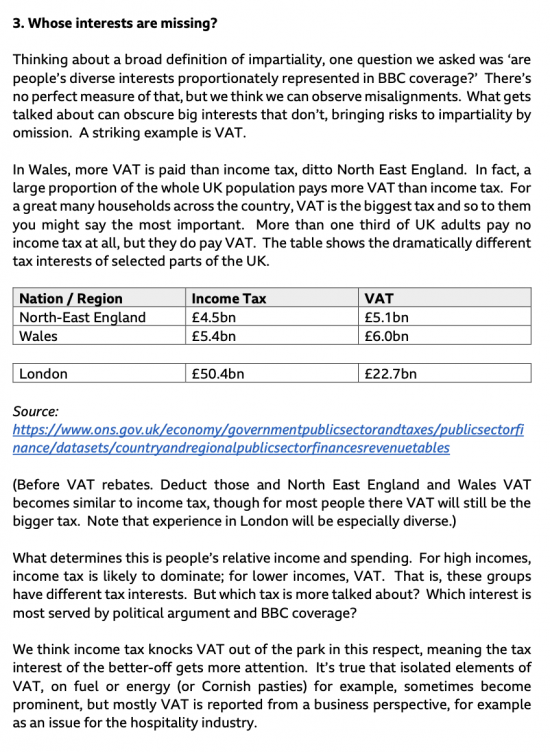
These two sections by themselves speak of profound class and regional biases that suggest significant partiality. As they note, balance between the front benches is not enough:

The report did correctly note that there is a need for the BBC to emphasise that many so-called facts in economics are just choices:

Too often they imply that the BBC suggests such choice does not exist, when actually it does. This comment on fiscal rules is illuminating on this:

Fiscal rules are just made up. They aren't rules at all.
But perhaps the most telling comment that was not given sufficient emphasis was this, on the fact that most journalists are not retained in economics, even when they have been commenting on it for years:

There is, in other words, a bias to the 'norm', which is the mainstream view because the experience to question it is lacking.
I think the report is more critical in reality than it superficially appears to be. And the bias is to the right, whether the authors appreciate it or not (and they may not be seeing the bias in their own work). The BBC has a lot to do to get this right. But they are not alone.
Appendix - the report's main findings, in summary
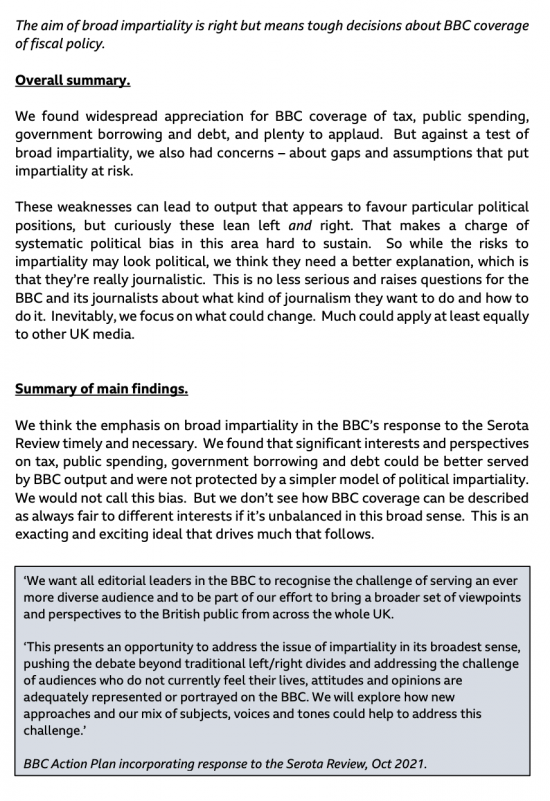
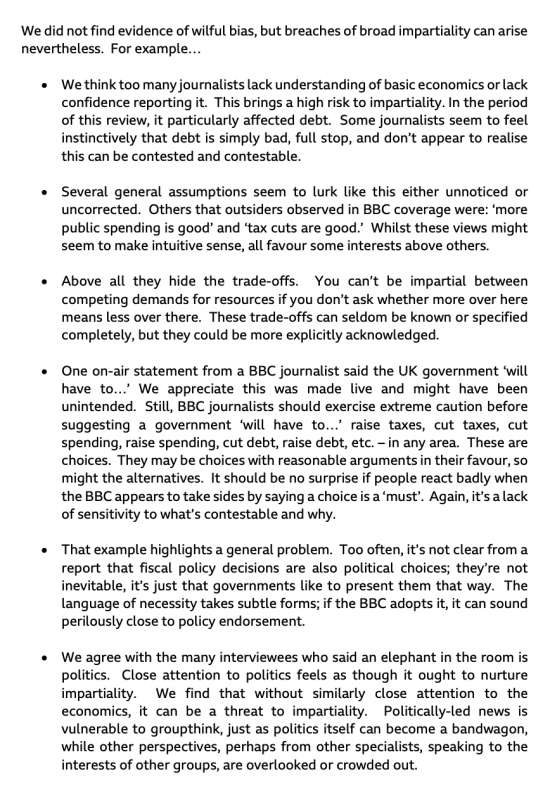
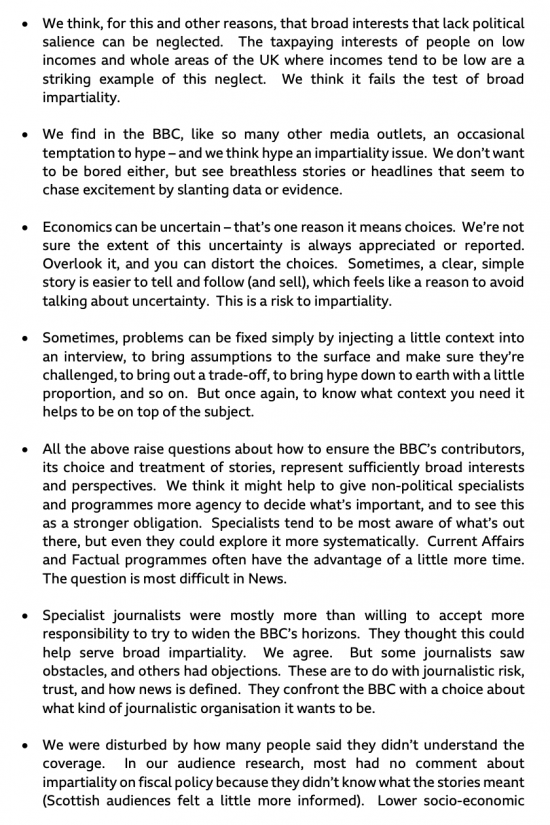
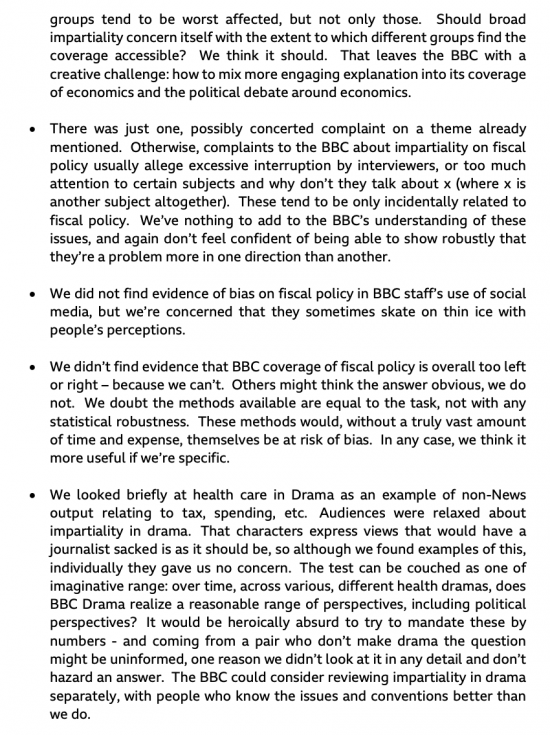
Thanks for reading this post.
You can share this post on social media of your choice by clicking these icons:
You can subscribe to this blog's daily email here.
And if you would like to support this blog you can, here:



bullet point two ‘dedicated by political parties’? Dictated ?
Yes. Edited. Thanks
A really excellent report, I think.
I tend to agree with your view that the tendency to lazily embrace “conventional wisdom” leads to a bias to the right… but I realise a report that concluded “the BBC is biased to the right” would go straight in the bin. So I commend them for delivering a “party politically neutral” report that still has good stuff in it. However, change will be difficult.
(1) First and foremost, good journalists must be good communicators; this is a limited pool of people. Real economics experts are also rare…. and drawing a Murphy Venn diagram gives a very small intersection. This will always be a problem.
(2) Great (as a opposed to good) journalists have the knack of really listening to, understanding and learning from “experts” and then communicating those ideas to their audience…. but this takes time and in the current 24/7 news cycle that is very difficult. This is unlikely to change.
(3) Even reporters with an Economics education might still be a problem. What did they learn? The stuff that most universities taught 10 or 20 years ago has proved to be nonsense (indeed, that is still the case to a large extent). Someone that thinks they knows something is more dangerous than one that knows they don’t! “Re-education” is often harder than “education”.
(4) Sometimes the consensus is right. The BBC has rightly been criticised for giving to much air time to climate change deniers and a range of Brexiteer “swivel eyed loons”. Those propounding (say) MMT might be viewed by some in this light… and this will take time to correct.
So, formidable challenges!
Having spent over 10 years talking to financial journalists (mainly in the 1990s to Reuters, Bloomberg etc.) I learned a few things.
(1) If you are going on the record, choose where and on what subject and then prepare well – your credibility and professional reputation depend on it. But most of my interactions were “off the cuff” so I insisted on them being non-attributable – whether through me “mis-speaking”, them mis-understanding/misquoting – some of the articles were garbage and I am glad my name was nowhere near them!
(2) Most journos are just after something to write to fill the space and meet the deadline. Give them something short, simple that requires little effort for them to convert to an article. Avoid the temptation to be dismissive… you never know.
(3) A few are genuinely enquiring; they are rare and deserve attention. First, it is fun. Second, you can really get them to think deeply about the assumptions they make…. and that is the prize.
Thanks
The micro bias is a big issue
It creates a systemic bias this report does not address
Very good Blog Richard, if I may say; and a very good comment Clive (although the strict take on what you actually wrote, as in ‘risk-free’ for the interviewed, is – don’t talk to journalists; statistically, they aren’t up to it, so it really isn’t worth the risk).
I was looking for the full BBC report last night online, and couldn’t find it. Obviously you did Richard; where is it to be found?
I agree about ‘The micro bias is a big issue’. I have even found it distorting issues in intellectual history, where I was reading a very good paper by economic historians on a subject I am researching, and was astonished to find they drew bizarre conclusions from good analysis; because they pre-determined (without refernce to evidence or sources), that ‘macro’ is just a veil covering the reality of ‘micro’. That was the second time I have fallen off my chair recently (the first was a Conservative MP on C4 News defending Sunak on Zahawi).
I can’t speak to the whole paper, not having read it; but have they covered the ‘micro’ bias? Have they addressed the ‘don’t leave it be paid by our grandchildren’ proposition (a variant of, when did you stop beating …..); which is absurd if you are not going to pay off the National Debt instantly; and that merely has to be stated to be seen to be absurd (or should be – but is it in the BBC?).
They have not addressed the micro bias as much as they might
The paper overview article is linked in the first line of the post, and linkable from there
https://www.bbc.co.uk/mediacentre/statements/bbc-board-response-thematic-review-taxation-public-spending-govt-borrowing-debt/
Yes, micro versus macro is a big blind spot in various areas (not just broad fiscal policy) but I do think they tackle this issue, at least obliquely.
Eg. it says that “”debt is bad” is a contestable issue” and “”must” should be avoided when the issues are contestable”.
Thin gruel. I accept…. but significant enough, I hope, for some journalists to be more challenging to the status quo.
Sorry Richard, I am probably being very obtuse, but I had the ‘overview’ okay yesterday, but I still cant locate the link from there.
It was in my last reply
Full BBC report
https://www.bbc.co.uk/mediacentre/2023/thematic-review-taxation-public-spending-govt-borrowing-debt-output
Then go down to the section “Notes to editors” and click “The full review can be seen here.”
I think the expression is “you couldn’t make it up”. On BBC Radio Scotland this morning a hapless interviewer, who was either being disingenuous, or literally didn’t understand: asked a union leader in one of today’s strikes if she hadn’t missed the opportunity for an improvement for her labour, because the rate of inflation was about to fall……..
A pefect example of the real problem of ignorance and inadequacy in what passes for adequacy in ‘journalism’ on BBC Scotland News in the modern world. The corollory of that interview is the interview with a Conservative-Unionist politician/apologist who claims that inflation is coming down, or takes credit for the fall, and presents that as a solution; and the BBC interviewer allows the comment to stand, unchallenged. I have already heard that approach on BBC news programmes. Whatever did happen to the ‘education’ and ‘inform’ parts of Reith’s maxim? It fell down the back of the sofa, presumably; the stultifying effect of all that ‘entrtainment’.
Credit to the union leader, she explained the difference between a rate of inflation and a price level; and suggested that instead of the poorer paying for the Government’s mistakes, they could start taxing the CEO’s with an average 39% uplift (according to her); tax commensurate with their wealth. The stark difference in understanding should worry the BBC management in Scotland, but presumably will make not a jot of difference.
Incidentally, thanks Mr Tresman, I had missed that part of the link!
Could it be, Richard, that much of the economics that is taught in basic courses contains a bias towards micro (or handbag) economics? Or perhaps is intuitively easier to understand (close to home) than anything that is remotely political or too large-scale?
TRhe micro bias is a big problem when most reporting is on macro
I think that the way macro is mixed up with micro is one of Steve Keen’s criticisms of neo-liberalism if I remember correctly – part of its reductionism or over simplification and resulting false and self serving narrative.
I’m very disappointed in those arts students though BTW – aren’t you? I’m technically an arts student but I like to think that I know the meaning of truth and being accurate. Jesus!
Thank you for sharing this.
Bring Back William Hardcastle! Admittedly, from another age, but he and some of the early news interrogators rarely took hostages from amongst the obfuscating political class. Perhaps their difference was that some had other income streams and skills that could be invested elsewhere, so were less beholden to the BBC as their employer. I accept that good relationships between interviewers and subjects are important, but cosiness is not. Sadly, as we saw over Brexit, it seemed to me that the BBC’s news editorial policy for most of the engagement was to set up Johnson against Cameron rather than give space to the obvious risks that Brexit proved to bring. I appreciate that interviewers must be polite, but an occasional, ‘Shut the fk up, and answer the bldy question,’ is certainly hurled at the TV screen in my household.
Re your last, ours too….
I think the claim of bias towards the left and right is a way of avoiding criticism from both sides.
Since we have had a Conservative government for the last 12 years, then ineffective journalism must appear like right-wing bias. I think if Starmer was PM continuing New Labour neo-Liberal policy, then it might appear like left-wing bias.
This is a really interesting post, thank you for bringing it to our attention.
I have spent the last 10 years shouting at the TV whenever the BBC covers fiscal matters. Apart from when you are on the Jeremy Vine Show, we hardly ever get to hear the “non orthodox” view on wider economic issues. It is a tad heartening that this report is saying these things, it shows there is someone aware that the past coverage has not been anyhwere near challenging enough.
The BBC really need to be asking more and deeper questions of our politicians, the latter of which are just as likely to be lack a good economic understanding as the journalists asking the questions. So its always apppered like the blind asking questions of the blind for the way forward( no offense intended to blind people).
We need a review of the economic qualifications of our MP’s , but it is hard to see how that could happen. I would suggest, though a mandatory subsription to Taxresearch UK at the very least! They may not all agree with you, but at least they would have to face up to long held incorrect beliefs and misconceptions.
Thanks Richard – most informative.
“We’re a sort of a team of arts graduates basically”………reporting on a wide range of subjects many of which require expert input, which the BBC is functionally incapable of providing & thus it uses outside so-called experts to provide a usually biased input. Pathetic does not even come close.
The majority of the BBC’s income comes from people that use buses and pay (mostly) VAT. The report shows that this group is not catered for in the least, with instead the BBC covering issues that reflects the biases & interests of BBC staff/the better off middle classes. I guess it is one way of keeping UK serfs and peasants in their place (& suitably grateful for the crumbs that fall off the table of their betters). The Bourgeois Brainwashing Concern.
🙂
Interesting comments about buses in the report. In fact people who use buses do so locally, so it’s more important that the problems with buses are discussed on the local BBC news programmes. Weownit have started a campaign to bring buses back into local ownership in various areas. They got together with Andy Burnham and local voters to sort out the Manchester ownership. They are now working on West and North Yorkshire.
https://weownit.org.uk/public-ownership/buses
“Those reporters are too willing to have what they report dictated by political parties and, most especially, other media;”
I have made the point ‘umpteen’ times, but this is a demonstration of its truth. BBC “impartiality” never asks the basic question; impartiality for the BBC is tested against what measure or standard. It can only be against other media. Terrestrial media in the UK broadly followed the BBC (because it began AS the standard); the BBC standard could only be set (when set up in 1924, and it remains implicit today) against the press media. This is the reason neoliberal (Conservative supporting) billionaires are so keen to own newspapers; because every single day they set the news “agenda” against which the BBC establishes where the ‘standard’ of opinion has estabilshed itself, for every event, for every change in policy of a politician.
Just look at how much free coverage of the newspaper coverage, editorial and opinion pieces are promoted on TV every day and night (Sky cover newspapers heavily, BBC Newsnight relies heavily on interviews with editors and columnists, and offers nightly headlines from mainstream press). It is also striking how both TV and press media abhor social media journalism, just because it is not part of the cosy, insider, agenda setting so-called standard.
I note that every time I raise this, virstually nobody is interested. It makes my point. With such lack of public interest in this cosy ‘set-up’ of standards, this will never change; and neoliberal, heavily politicised free-market, ‘household’ Government financing, and on and on – will never change.
QED.
Correct re comparison with the right wing media: an essential point
It would be interesting to see the regional tax data with NICs added. I suspect income tax plus NICs will substantially surpass VAT in all regions. But it doesn’t get past the point that everyone pays VAT and despite benig geared to consumption and zero rating of “essentials”, it it regressive in total.
I hope the current generation of economics undergraduates are getting a better rounded economics education that “supply and demand” and the “invisible hand”.
Thatcher was entirely clear about her programme in 1981: https://www.margaretthatcher.org/document/104475
“What’s irritated me about the whole direction of politics in the last 30 years is that it’s always been towards the collectivist society. People have forgotten about the personal society. And they say: do I count, do I matter? To which the short answer is, yes. And therefore, it isn’t that I set out on economic policies; it’s that I set out really to change the approach, and changing the economics is the means of changing that approach. If you change the approach you really are after the heart and soul of the nation. Economics are the method; the object is to change the heart and soul.”
After four decades of increasing individualism and inequality, I hope the pendulum is starting to swing back the other way.
Current economics get a dire education in second rate maths and almost nothing at all on economic understanding
The best book I’ve seen on economics is:
The Macroeconomics Anti-Textbook: A Critical Thinker’s Guide by Tony Myatt (Author)
https://www.amazon.co.uk/Macroeconomics-Anti-Textbook-Critical-Thinkers-Guide/dp/1350323713/
From the preface: In the companion book, The Microeconomics Anti-Textbook, Rod Hill and I explain that most economic textbooks are practically clones of one another. They portray economics as a value-free science, with a settled methodology, and a broad consensus among economists about most economic issues. They apply demand and supply ubiquitously and conclude that markets are generally efficient. Government regulations, such as minimum wages or rent control, are undesirable and end up hurting those they are meant to help.
Our aim in the micro anti-text was to critically examine those claims. We show how value judgments pervade economics and economic textbooks. We point out that there are deep divisions within the profession, and that testing hypotheses is full of difficulties that makes reaching firm conclusions over even relatively simple issues (like the effect of minimum wages) rather difficult. We emphasize that the demand-and-supply framework is synonymous with perfect competition, and non-competitive market structures lead to different conclusions. The key issue is one of model selection.
These themes continue in the macroeconomic anti-textbook. Once again, the ubiquitous use of the perfectly competitive market structure creates (or perhaps reflects) an ideological bias. This is particularly important in two markets: the financial (or loanable funds) market and the aggregate labor market. The fact that the financial market is depicted as efficient, with all participants having perfect information, contributes to the view that the financial system is the source of great wealth creation rather than a source of instability and a center of white-collar crime. When it comes to the labor market, the reflexive application of perfect competition allows mainstream textbooks to parade minimum wages and unions as villains responsible for increasing structural unemployment.
####
Thanks
I have stated before that society cannot change if the mass of people are kept, deliberately ignorant on the fundamental economic basis of their lives.
The vested interests of the rich aka the ruling class will never allow ordinary working class teenage school children – 15/16 year old to learn how to use money ‘sensibly’. To develop the ‘long view’ something that has been the case in countries like the Netherlands/Germany/Scandinavia for a long time. Young people want to know how to be ‘smart’ to know what the craic is. Imagine a generation of young people who can recognise crap insurance policies, Pensions that are gouged by ‘charges’. That are never told that single premium plans are guaranteed to totally outperform regular premium plans. How many even know of the existence of SIPPS Mortgages – don’t show/let the mugs know that 30 year mortgages are one huge rip-off. That by not becoming a consumer junkie, instead pay off your mortgage debt as fast as possible and save a fortune. The aberration of insanely low % rates will not last forever. The equally insane price of property in the UK is already beginning to crack. Why is the UK the only country in Europe that doesn’t have rent controls.
The BBC has never, will never cover any of these points. Their business programmes are for retards only. The English bias for a company that is supposed to cover the whole UK is so blatant it’s become a sick joke. The use of the word ‘British’ is the classic example.
My source for real TV information is Al Jazeera on just about everything. The whole of Western TV not just the BBC is a biased joke in comparison. It is so obvious that many of the newsreaders are reading from prepared scripts and are totally ignorant and unable to respond or question intelligently anyone they are ‘interviewing’.
Hi Richard – a technical note.
I saw your post on Mastodon about this article, but clicking the link there takes me to an unrelated article from 2009. This is because the URL in the post is immediately followed by other text with no space in between. This leads to the following text being wrongly interpreted as part of the URL. I have seen this problem in a few of your earlier posts (or toots) and have replied to them on Mastodon to point this out. But I got no response, so now I’m trying here.
Sorry
I will redo it
That is a fault in the mas.to link mechanism
I honestly think this is one of the best assessments of problematic media coverage of economic issues that I’ve read. The Today programme is not alone in demonstrating exactly the biases highlighted, but it is the news coverage to which I most often listen. This needs to be the topic of ongoing personal development programmes in the BBC.
I agree that it has its faults, but I agree with others above that it’s quite remarkable and very interesting.
It could potentially open a huge opportunity for you, Richard, perhaps with Danny Blanchflower, to lead much more effective challenges on the BBC (and possibly other media later) on orthodox economic reporting.
One note of caution-it mentions that the report has to be approved by the Director-General and his executive team. If he can get away with it, he might bury it!
“most journalists are not retained in economics” Should this be ‘trained in economics’?
Yes
Yes Richard – – their core and entirely valid critique, esp of BBC seems to be :
‘Close attention to politics feels as though it ought to nurture
impartiality. We find that without similarly close attention to the
economics, it can be a threat to impartiality. Politically-led news is
vulnerable to groupthink, ‘
An immediate example tonight on the BBC 3rd anniversary brexit debate – cited by the German commenttor Annette Dittert https://twitter.com/annettedittert/status/1620517639951978497
‘Exhausting and lots of unchallenged disinformation again. – Why can’t the BBC instead do a proper documentary that tells the truth as it is?
That would be taking stock. Not this absurd debate that makes me feel as if it was 2016 all over again. #TodayDebate
The ‘debate’ is the politicians defining the economics – and the BBC thinking they have done their job if they have two politicans disagreeing – even if they have both ignored the core econonmics – just as was the case during ten years of climate ‘debate’.
But I bet the BBC wont stop the politicians defining where the ‘truth’ begiins and ends.
Agreed
The Guardian has now reviewed the report:
Bad economics at the BBC enabled Tory austerity and its aftermath – and it knows as much, Tue 31 Jan 2023.
https://www.theguardian.com/commentisfree/2023/jan/31/bad-economics-bbc-tory-austerity-uk-politics
Sadly Meadway’s arguments are, frankly pathetic. Extract:
“There are reputable economic arguments for austerity. “Expansionary fiscal contraction”, as developed by the political economist Alberto Alesina and others, was one of them. A decade of experience suggests that it was terribly wrong, but this was at least a coherent argument, based on a recognisable economic logic. That case could have been presented, alongside opposing views, as part of an effort to promote public debate and understanding of the issues around the public finances. The review points out that genuinely impartial reporting would show that different choices can be made around economy policy.”
The first sentence is contradicted by the third (a decade of experience … terribly wrong). So no the argument wasn’t reputable in the least, neither was it a “coherent argument, based on a recognisable economic logic”, thus does Meadway become a tory apologist. Pathetic stuff, he needs to up his game – or better still – stay silent if this is the best he can do.
Wholly agreed
He has been out of his depth for a long time
“There are reputable economic arguments for austerity.”
A better argument would be to present the evidence that austerity works, but it is not forthcoming. In recent times, it seems that even Milton Friedman did not advocate austerity, but Ronald Regan either misunderstood, or took advantage of Friedman’s ambiguous suggestions in order to reduce government “interference”. See What Reagan’s Greatest Economic Adviser Thought About Austerity, Forbes, (2013) https://www.forbes.com/sites/pascalemmanuelgobry/2013/06/05/milton-friedman-on-austerity/
The evidence shows that austerity does not work for the general public and the economy as a whole. To discover the motive for implicating austerity, we should “Follow the Money” ( https://www.youtube.com/watch?v=QodGxD19_as ), and see who benefits. Again, the evidence is clear: energy, oil and financial markets.
See Also:
Austerity: The Great Failure (2014) https://www.amazon.co.uk/Austerity-Great-Failure-Florian-Schui/dp/0300203934/
Austerity: The History of a Dangerous Idea (2015) https://www.amazon.co.uk/Austerity-History-Dangerous-Mark-Blyth/dp/0199389446/
Thanks
A few observations:
I don’t watch BBC news though I did see Newsnight a few years ago with an appearance by Mariana Mazzucato. Both the presenter and the Tory panelist for “balance” were totally nonplussed by her cogent arguments for State intervention to the extent that it was like Mariana was speaking a different language.
Inflation and the BoE – I do listen to BBC6 music daily so hear the news every hour and I do on occasion look at the BBC website – the notion that the BoE MUST raise interest rates in order to curb inflation is always (ALWAYS) presented as fact with no granular analysis of what is causing inflation and what the outcome of raising interst rates actually is. It is simply reported as an uncontestable fact of nature
A recent article on the BBC website on Japan. In amongst a lot of reasonable commentary there was a comment on the current (MMT informed) policy of the BoJ re debt and deficits to the effect that the BoJ (and Japanese govt) were increasing public debt levels and keeping interest rates low and by implication this was unsustainable and thus necessarily a “bad thing”. No acutal economic analysis, just the increase in public debt presented as a de facto problem
The idea that there is any kind of left wing bias in BBC economic reporting is absolutely laughable. The sustained hatchet job on Jeremy Corbyn, the continual promotion of what 30 years ago would have been seen as fringe idoelogy of the Institute of Directors, Farage and Rees – Mogg as mainstream and the demonistaion of public sector workers (plus rail and mail which should be public sector) are evidence enough. That New New Labour with Starmer and Reeves as True Believers in neo-liberal economics can be in any way seen as “left” gives ultimate truth to the lie.
Just watch this brilliant YouTube, “The Spiders Web”. Explains & demonstrates, the true power hidden, & open when confronted, re why UK social society being so dangerously eviscerated.
https://youtu.be/np_ylvc8Zj8
I should have been in it
I always regret not making the time
Interesting that BBC reporting on choices and decisions made by the Bank of England don’t appear to receive any specific coverage in the report . If this is an omission it seems an important.
What I want to know from the BBC is why they are not looking at stuff like this:
https://stephaniekelton.substack.com/p/the-national-debt-is-no-ones-fault?utm_source=substack&utm_medium=email
If the BBC’s remit is to inform us, then it is a failing institution that needs serious reform or getting rid of in its current iteration. Why not get rid of the BBC and give all these other platforms telling us the truth about money a boost with their budget?
Let the BBC do ‘Strictly’ and all the other shite it produces as it chases viewing figures.
Once again on R4 I heard the trope about the UK government borrowing money from private banks (the early morning reporting on business and economics might as well be from another world – except that it isn’t!!).
OTOH I’ve also heard how poorly paid reporters are and how tight schedules are too, as well as admin so that producing programmes that are well researched and balanced is very difficult – I wonder if that was what Mr Birt left behind I wonder?
Has to be said economics is not an easy subject. I’m from a philosophical background so it’s not that I struggle to understand the stuff I come across, however, there’s just so much ignorance on my part. What doesn’t help is I can’t read economics as it literally sends me to sleep. However, I’ve found your insights on money creation fascinating and I have dispelled the household budget fallacy, so I’ve managed to develop at least some understanding over the last year following your blog.
However, when thinking about the ‘arts geaduate’ journos it reminds of hallons razor:
“Never attribute to malice that which is adequately explained by stupidity.” I’d replace stupidity with ignorance though, as they are simply uninformed, as a great many of us are on economics.
🙂
Rickster
I would love for you to be right on the malice versus stupidity theory – indeed it could be said that for malice to succeed you need a lot stupidity to go along with it. But it is not just stupidity even though Frank Zappa thought stupidity was the most plentiful element in the universe.
But I’m not so sure. Hannah Arendt and her ‘banality of evil’ concept indicates that in any society there are always those amongst us who find authoritarian reductionism attractive (the presentation of the worlds problems as the result competition for resources between different groups and the exploitation of that).
The other consideration is partiality – human beings are fond of what they think they know – if they are partial to their prejudices and find ways of affirming it – all too easy to do these days.
Are the BBC immune from all of this? I think not. BREXIT is still a schism in our society (did you listen to R4 last night and Rees-Mogg being given too much air time AGAIN) and eugenicist thinking – the ascribing of certain social problems to the people who face most of those problems – is on the rise, the more we are told nothing can be done (read Timothy Snyder).
Then – if you may – you might want to dip into ‘The Road from Mont Pelerin’ (2015) and see how many of these corrupt ideas were organised by rich vested interests into being or read ‘Never Let a Good Crisis Go To Waste’ (2013) where the advocates of the crap the BBC unthinkingly vomits over our airwaves give their Fascist selves away and show how undemocratic they are in their own words.
I’m not being dour or defeatist here: all I’m suggesting is that we face up to what we are actually confronting and give it no benefit of the doubt whatsoever. None.
It is purely malicious, and preys on the not so nice parts of human nature.
One day this thinking will be seen as anti-social. At the moment though, it is very dangerous. We are in a bad place and we need to call it out for what it is or we are toast.
I saw this economist/trader on the new last week on the BBC,so he is another good voice articulating big issues very well. He gets the big picture.
https://www.youtube.com/watch?v=e1sD80TXKwQ
He also has a good website where he gives a good suggestion as to how to define rentierism ( as was dicussed here a few weeks ago) He simply calls those who live off asset income so that they cannot even spend all their income “the wealthy” and those who spend all their labour earned income just to survive, the “Weathless”, a neat summation.
As far as I am aware all the pieces of Independent UK academic research done on BBC coverage have come to the conclusion that there is a very large right-wing bias.
Many of the reasons have been discussed above but there at least two other causes of this problem.
Firstly, many, possibly most, BBC journalists come from the same family, school and educational backgrounds as right wing politicians and journalists. As a result there is a considerable sharing of a world view about what is normal and as Sunak, Braverman, Patel and Zahawi in politics have demonstrated, diversity needs to mean more than just race or gender.
Secondly, every BBC journalist knows that any challenge to the consensus views of the Sun, The Times. The Mail or the Telegraph is seriously career threatening. The BBC will too scared to promote you and finding a job anywhere else in the media-sphere will be next to impossible. How much easier to just go with the flow, adding just a little bit of token balance for appearances sake.
Until the BBC has a leadership that is prepared to address these problems it will never be able to be the independent National news provider that this country desperately needs
The Cardiff research supports your claim
This report assumes impartiality is defined within a right moving Overton window, I think
I see that, in the Report, it is suggested that more use is made of experts, rather than rely on the limited knowledge of their journalists.
In a recent complaint to the BBC about one of their regular online articles on why the Government needs to borrow, I suggested they ask you to rewrite the whole item.
They have not been in touch…..
What a surprise!
For listeners of Radio 4 note there will be a 5 episode series each day Feb 6th to 10th called UNDERSTANDING: The Economy, to be aired at 13:45 to 14:00.
Heaven knows what they will present us with? Will Richard or will MMT be given any presence? Or will the handbag economy for the whole UK be given a slick once-over. Once again?
It is possible to get a preview listen, I think, at :
https://www.bbc.co.uk/sounds/play/m001hwzj
We look pensively forward …
Phil
Is this a repeat of a series I was involved in, a little. It might be
The BBC Sounds series “Understand the Economy” ran from 31 Oct 2022 originally shown on Radio 4 here: https://www.bbc.co.uk/programmes/m001dwr7
No indication whether a second series is planned.
Not impressed with the Radio 4 Series Understanding: The Economy, 13. National Debt.
“The government borrows money and collects taxes; when the income and outgoings don’t add up, just like with our own finances, the government borrows to make up the shortfall.” https://www.bbc.co.uk/sounds/play/m001hx4q
The household analogy
I scream
Sack the BBC!
Richard, I understand your screaming. So do I, every time I hear this rubbish. What is so difficult about seeing a government as being different from a household?